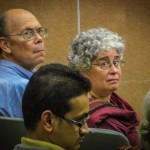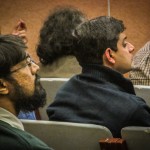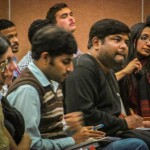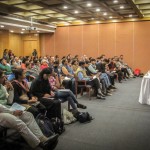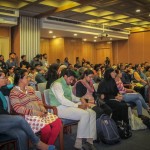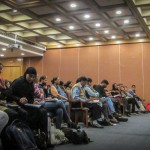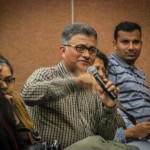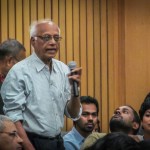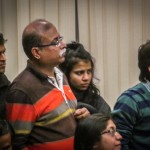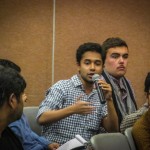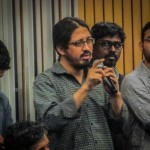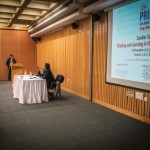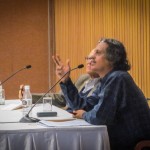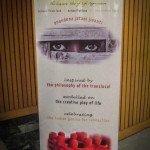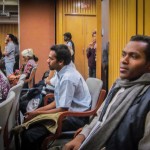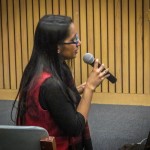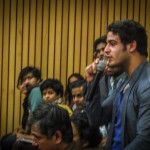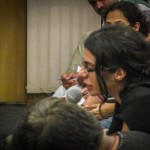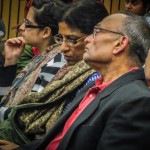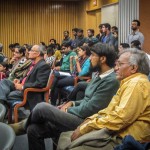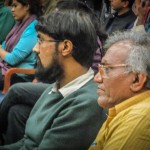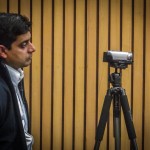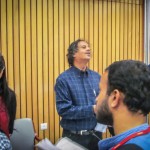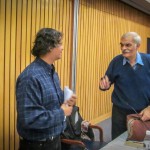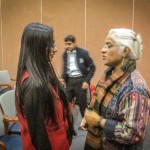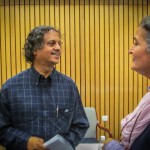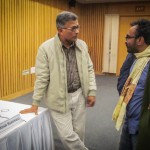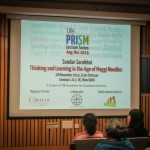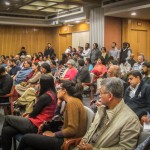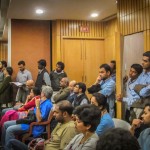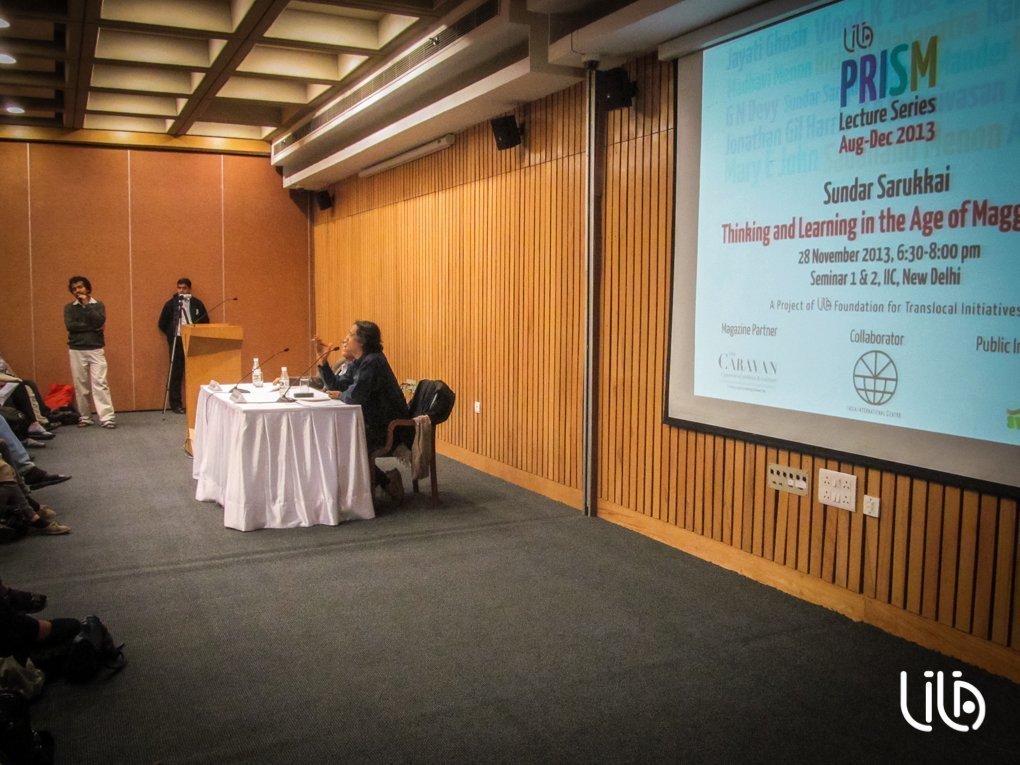
© Abdullah Abdul Hameed for LILA Foundation
Thursday 28th, November 2013 – India International Centre
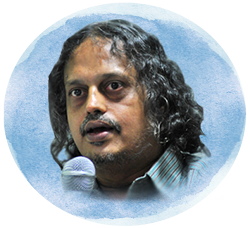 Sundar Sarukkai is the Director of the Manipal Centre for Philosophy & Humanities, Manipal University, India. He is the author of the following books: Translating the World: Science and Language (2002),Philosophy of Symmetry (2004), Indian Philosophy and Philosophy of Science (2005), What is Science? (2012) and The Cracked Mirror: An Indian Debate on Experience and Theory (2012, co-authored with Gopal Guru). He is an Editorial Advisory Board member of the Leonardo Book Series published by MIT Press and the Series Editor for Science and Society, Routledge.
Sundar Sarukkai is the Director of the Manipal Centre for Philosophy & Humanities, Manipal University, India. He is the author of the following books: Translating the World: Science and Language (2002),Philosophy of Symmetry (2004), Indian Philosophy and Philosophy of Science (2005), What is Science? (2012) and The Cracked Mirror: An Indian Debate on Experience and Theory (2012, co-authored with Gopal Guru). He is an Editorial Advisory Board member of the Leonardo Book Series published by MIT Press and the Series Editor for Science and Society, Routledge.
Krishna Kumar, professor of education at the University of Delhi, India, introduced the speaker and moderated the discussion. Noted for his writings in sociology and history of education, Krishna Kumar has used the school curriculum as a means of social inquiry. He has framed his study of education in a critical engagement with modernity in a colonized society. His writings explore the patterns of conflict and interaction between forces of the vernacular and the state. As a teacher and bilingual writer, he has developed an aesthetic of pedagogy and knowledge that aspires to mitigate aggression and violence. In addition to his academic work, he writes essays and short stories in Hindi, and has also written for children. From 2004 to 2010, he was Director of the National Council for Educational Research and Training (NCERT), an apex organization for curricular reforms in India.
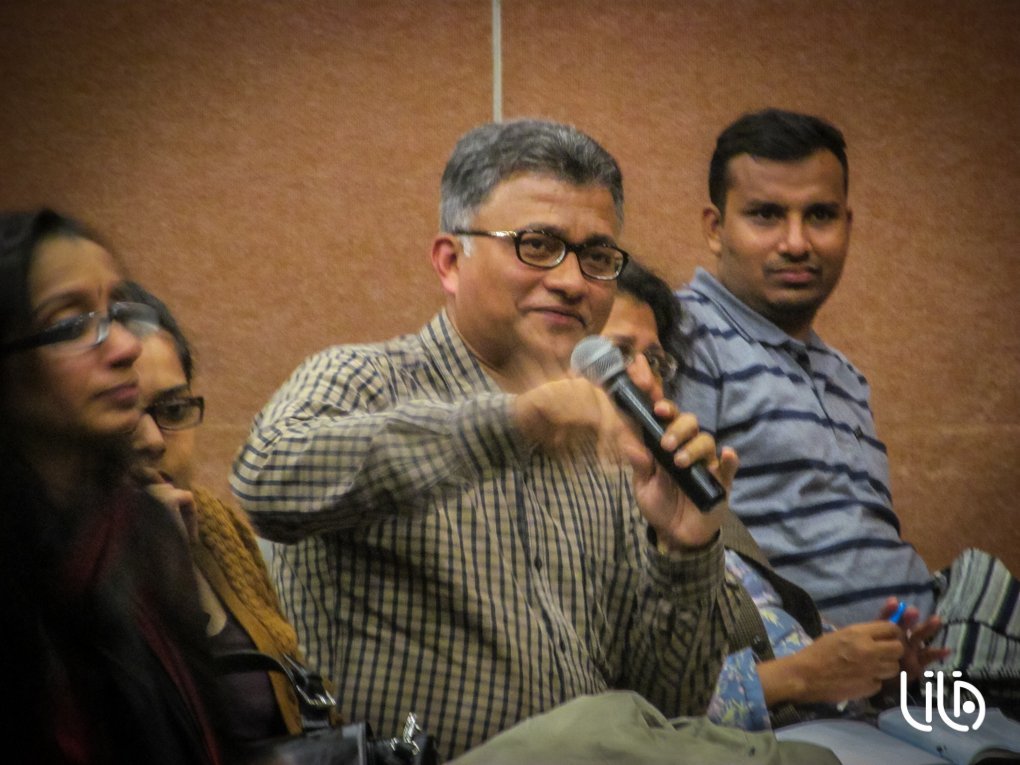
© Abdullah Abdul Hameed for LILA Foundation
The Lecture: “Thinking and Learning in the Age of Maggi Noodles” explores how there is no time for thinking or learning in the age of instant desires, instant gratification and instant results. It is remarkable how the instant culture has eroded traditional notions of education. It is not a surprise therefore that philosophy too has had to bear the brunt of a culture that wants instant success, instant stardom and instant knowledge. And the greatest casualty of this culture is the notion of thinking. Thinking needs time, a commodity which is not available in the instant age. Time needs duration to allow thinking to happen. Thinking brings together the fundamental concerns of education and philosophy. This talk will be about re-inventing time and the process of thinking in contemporary education. This can be best accomplished by revitalizing philosophy and understanding its role in creating a humanistic society.
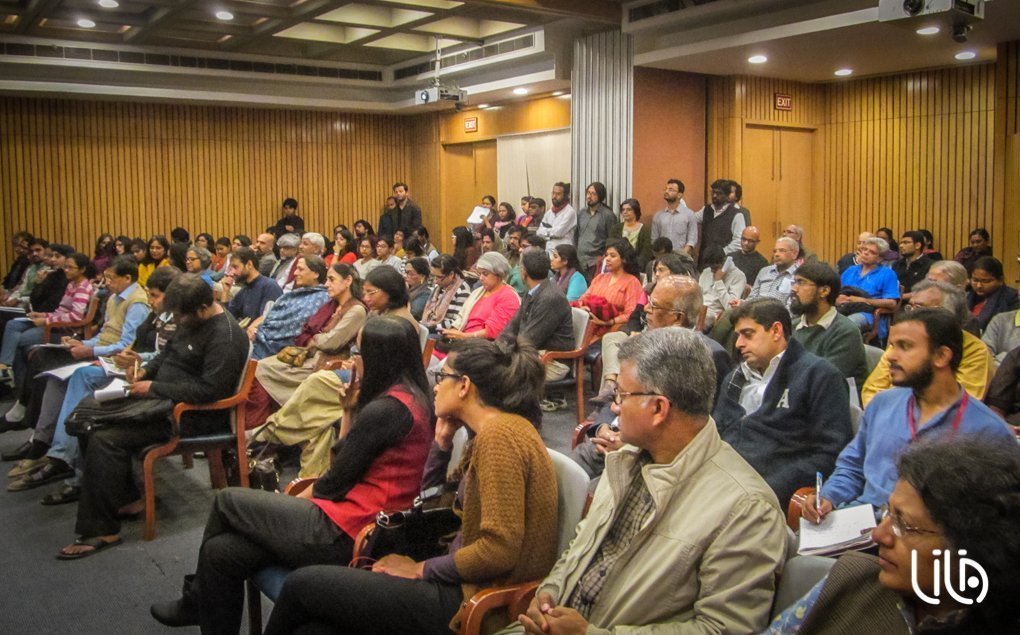
© Abdullah Abdul Hameed for LILA Foundation
In this remarkable lecture, Sundar began by telling us about a pedagogical experiment they have initiated at his University, wherein ‘themes’ are the fields of study and not particular disciplines. One of the ‘themes’ that they are dealing with is ‘Thinking and Imagination’. From this academic context, one question emerges: “What is the relevance of ‘thinking’ in education, especially in our times of ‘instant culture’?”
Ironically, the constant complaint that one hears in our Maggi noodles times, even as it seems one can instantly access ‘happiness’ with less work, is that one has ‘no time for thinking’. There seems to be constant anxiety about things one has ‘to do’ despite the availability of ‘instant’ means of doing them; about the isolation that one feels despite technology bringing a network of ‘friends’ and resources from across the world to one’s fingertips; about the loss of political consciousness and ‘voice’ as one makes rapid, short exchanges with a lot of ‘faces’, instead of long reflective conversations with people whom one has a connection with. Academic capitalism seems to be facilitating tie ups that do nothing but perpetuate this anxiety, and bring into focus one’s inability to cope with the stress of doing it all (alone?).
Sundar here invoked John Dewey who places ‘reflection as central to learning’, and goes on to explore what reflective thinking vis-à-vis the widely prevalent dictum, ‘no time to think’. In Deweyen terms, thinking involves four elements:
1. a meaning-making process that gives continuity to the act of thinking,
2. the spirit of scientific inquiry,
3. an association with community experience,
4. a sense of human growth, including moral and emotional uplifting.
Such reflection amounts to a set of attitudes like openheartedness, responsibility, directness, wholeheartedness… These attitudes are integral to the sites of ‘teaching’ and ‘learning’.
To bring forth the importance of the ‘to think’ act, Sundar spoke of Hannah Arendt, who reported on Adolf Eichmann’s trial. In Eichmann in Jesusalem: A Report on the Banality of Evil, Arendt’s invocation of the banality of evil provoked a lot of criticism, but what Hannah was actually referring to was this: Eichmann did not think. He was part of an administration that stopped people from thinking. One can see the drastic effects of non-thinking on humanity…
Having thus projected a paradigm for reflective thinking, and highlighting its link to education and human progress, Sundar came back to his original question: now, what does it entail, when one says one has ‘no time to think’?
Here, the focus of the talk fell on ‘time’ in relation to thinking. Time is required to ‘do’ things. The pertinent question here is one that was initially asked British analytical philosopher Gilbert Ryle: ‘what is one doing when one is thinking?’ Is thinking a ‘do’ thing like ‘running’ or ‘writing’? Thinking seems to be as vague about its ‘doing’ as the state, for instance, of ‘hurrying’. Thus, the significant question becomes: if thinking is no doing, then why does one require time for thinking?
We need a different experience of time to think, which the linear clock time is obviously not offering us. To highlight the linearity of time, Sundar mentioned common phrases that use linear spatial references: “way ahead”, “troubles behind…” He pointed out that we hardly use multi-dynamic spatiality as in words like deep, shallow, narrow etc to refer to time.
Nonetheless, dealing with time is always difficult. We constantly encounter the aporia of time, as Paul Ricoeur pointed out. The present of time, the now, seems unseizeable. But there are also different understandings of time — Ricoeur’s narrative time for instance — which can be used to facilitate thinking. In philosophy, this time is called phenomenological time, distinguished from the classical, mathematical time. It is in such a time, which does not practically exist, that we can lose ourselves while listening to music, reading, or doing any act that engages us. Sundar, in a move reminding us of the best advertisers of our economies, brought forward the following point: the understanding of time as a duration and not as an uncatchable instant can be drawn from the field of philosophy, the field of thinking about thinking… which happens to be his own discipline…
Hence, Sundar presented his appeal: philosophy needs to be brought into schools in order to facilitate thinking. It alone can help us synthesize information and make us arrive at meanings. He gave us two large questions to ponder on:
What use of time is relevant to recapture thinking in our instant age?
What kind of time characterizes learning?
Prof. Krishna Kumar was a fitting Chair. His comments not only matched Sundar’s engagement, but also pointed out some of the shortcomings in our ‘tabular’ education system, which imposes its authority on the children, and celebrates itself in finding newer ways of killing creativity. There was also some lighthearted dig at the venue that insisted on closing at a very linear time, 8.15 pm… The audience was eclectic, the q & a, insightful…: we only had a dearth of clock time.


